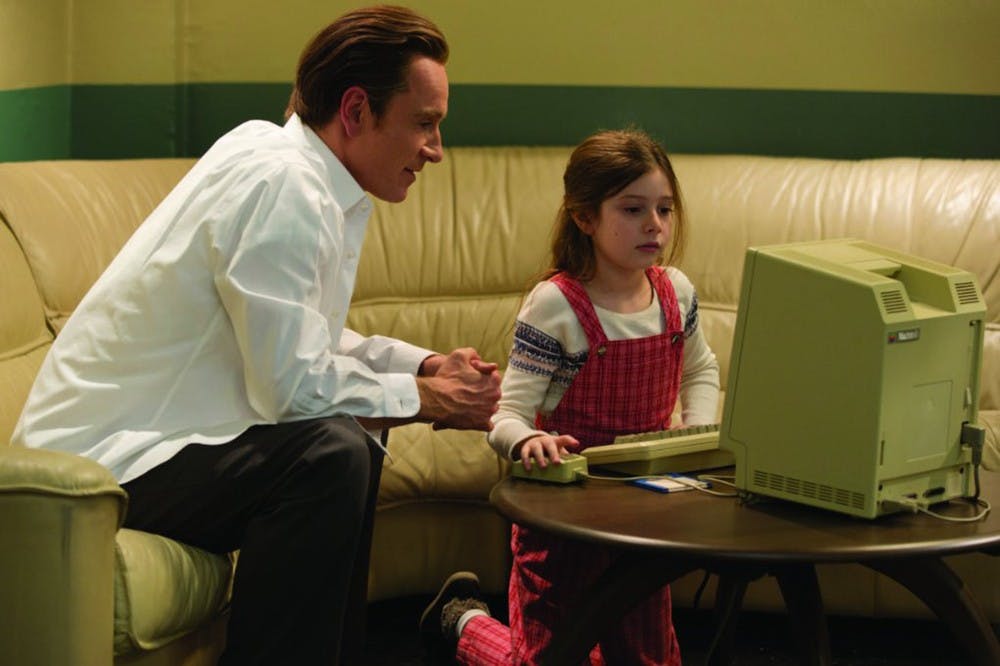Danny Boyle and Aaron Sorkin team up on “Steve Jobs,” a compelling and innovative look at the late technology guru's life that isn’t as compelling or innovative as it thinks it is. The movie tears apart the three-act structure by highlighting and following three of the most influential moments in Jobs’ professional life.
To emphasize the time periods, Boyle even chose to film each act in a different type of film: 16mm, 35mm and digital. The acting and technical elements are fresh and sensational, but Sorkin and Boyle’s heavy-hands mitigate the film’s audacity with convulsion, cliche and self-indulgence.
Steve Jobs (Michael Fassbender) and long-time business partner Joanna Hoffman (Kate Winslet) prep backstage for three different product launches: the first Macintosh in 1984, the first NeXT model in 1988 and the revelation of the iMac in 1998.
During each launch, Jobs meets with bosses, colleagues, collaborators and ex-friends such as Steve Wozniak (Seth Rogen), John Sculley (Jeff Daniels) and Andy Hertzfeld (Michael Stuhlbarg). Meanwhile, Jobs struggles to accept his place as a father to Chrisann Brennan’s (Katherine Waterston) daughter.
The most unexpected piece of “Steve Jobs” is its genius editing. Oscar-nominated editor Elliot Graham takes a lot of risks in the editing room, especially in the transitions between acts. As each act closes headlines, news excerpts and events fly by the screen, all stylized to be characteristics of the time.
The film feels like time travel, especially in the second act during the Sculley and Jobs falling-out, which is laced with fast edits between present time and flashbacks. Boyle elevated the different-types-of-film gimmick and made a technical masterpiece full of nuance. It is refreshing to see the aesthetic evolve with the film and a perfect deconstruction of the three act structure.
Some could argue that "Titanic" starlet Kate Winslet or the dreamy Michael Fassbender are the main drawing powers headlining “Steve Jobs.” I will make the case that Sorkin is — the public is familiar with and loves his work. Unfortunately, he is “Steve Jobs” biggest disappointment and one of its weakest links.
I’ve often wondered what life would be like if Sorkin wrote all of my conversations before I had them. After his recent masterful work in "The Social Network," "Moneyball" and "The Newsroom," I have become acquainted with his audacity and sass, but “Steve Jobs” is a lackluster addition to his repertoire and puts into question his previous work.
Where Sorkin fails is his inability to stay grounded. His freedom was evident as the whole production of “Steve Jobs” is loud with witticisms. That isn’t a problem. The problem is Sorkin’s tendency to write himself into circles and say things without really saying anything.
Unfortunately, it isn’t just the audience that is left to interpret the characters' intentions, but the characters seldom understand each other. Jobs, Brennan and Sculley all get chances to spit nonsensical poetry, and they can’t even keep up with each other. The characters constantly need clarification because Sorkin doesn’t know which wording is his favorite, which is annoying and which is self-indulgent. The end result is tumultuous and sometimes hilarious, but it is usually meaningless and inhuman.
Sorkin and Boyle clearly had different ideas on how to tackle the man Steve Jobs. Sorkin painted him as one of the world’s most insufferable dicks, only redeemed by Joanna’s respect and appreciation for him, but Boyle couldn’t commit. This results in a tonally misguided “happy” ending that ties everything together a little too conclusively, but somehow doesn’t warrant finality.
Luckily, the superb acting makes up for the slightness of the writing. Fassbender is a solid Jobs and physically evolves into the character by the third act. He handles the fire of the character and commits to the emotional push in the last act. The supporting cast is really terrific and everyone gets a chance to chew scenery.
Winslet has the biggest part and is very present in all three parts. Her big climactic moment is probably the best acting moment of the film, and she and Fassbender have great chemistry. Her Polish accent is a bit problematic as it goes from non-existent in the first act to heavy in the third. That is only a small quibble considering the resurgence of Winslet’s career — she’s adding a new oeuvre to her used collection of housewives.
All three of Jobs' male adversaries and colleagues are played capably, but the standout male supporting role is Daniels. Daniels’ performance is gripping and loud, but isn’t rang in. Sculley serves a different role to Jobs in each of the sections, but his performance matches the admiration and frustration he felt.
Oddly, the elements of "Steve Jobs" I expected to love fell short, but the film’s experience is elevated by its technical mastery and talented cast. “Steve Jobs” paints an intimate, mostly fictitious portrayal of the Apple icon in the same way David Fincher’s “The Social Network” examines Mark Zuckerberg: cold and ruthlessly. However, Boyle’s necessity for a happy ending affects the tone whereas Fincher commits fully. Ultimately, “Steve Jobs” isn’t “The Social Network” — few films are— but that doesn’t detract from its highs.
Related Links:
'Room' proves tough story to watch, but wins big at Toronto International Film Festival
Reach the reporter at tanner.stechnij@asu.edu or follow @tannerstechnij on Twitter.
Like The State Press on Facebook and follow @statepress on Twitter.




